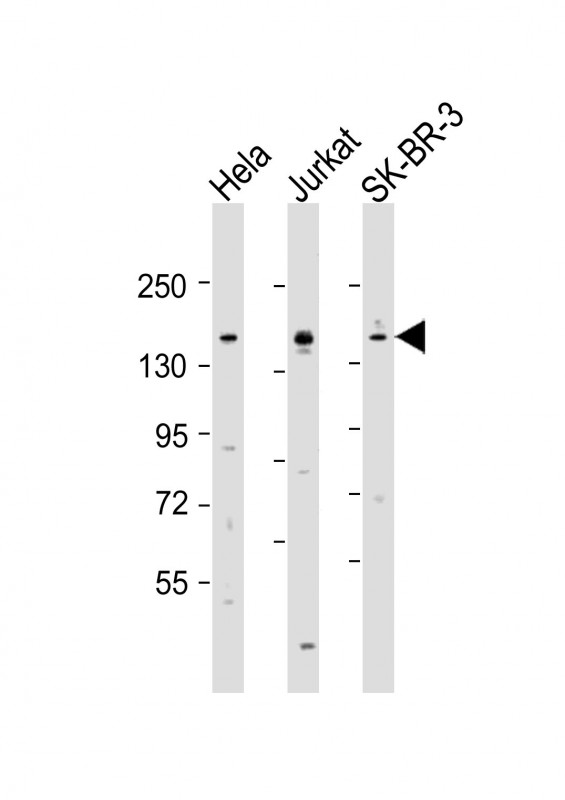
| WB | 1/2000 | Human,Mouse,Rat |
| IF | 咨询技术 | Human,Mouse,Rat |
| IHC | 咨询技术 | Human,Mouse,Rat |
| ICC | 技术咨询 | Human,Mouse,Rat |
| FCM | 咨询技术 | Human,Mouse,Rat |
| Elisa | 咨询技术 | Human,Mouse,Rat |
| Aliases | Fanconi anemia group D2 protein, Protein FACD2, FANCD2, FACD |
| Entrez GeneID | 2177 |
| WB Predicted band size | 164.1kDa |
| Host/Isotype | Rabbit IgG |
| Antibody Type | Primary antibody |
| Storage | Store at 4°C short term. Aliquot and store at -20°C long term. Avoid freeze/thaw cycles. |
| Species Reactivity | Human |
| Immunogen | This FANCD2 antibody is generated from a rabbit immunized with a KLH conjugated synthetic peptide between 893-927 amino acids from the Central region of human FANCD2. |
+ +
以下是关于FANCD2抗体的3篇参考文献,涵盖其功能研究和临床应用:
---
1. **文献名称**:*Interaction of the Fanconi anemia proteins and BRCA1 in a common pathway*
**作者**:Garcia-Higuera, I., et al.
**摘要**:该研究通过Western blot和免疫荧光技术,使用FANCD2抗体揭示了FANCD2蛋白的单泛素化修饰在范可尼贫血通路中的关键作用,证实其与BRCA1共同参与DNA损伤修复机制。
---
2. **文献名称**:*FANCD2 phosphorylation is a critical regulator of BRCA1-mediated DNA damage response*
**作者**:Wang, X., et al.
**摘要**:利用FANCD2抗体进行免疫共沉淀实验,研究发现FANCD2的磷酸化状态调控其与BRCA1的相互作用,影响DNA损伤应答和同源重组修复效率。
---
3. **文献名称**:*FANCD2 expression in ovarian cancer predicts chemosensitivity and patient outcome*
**作者**:Tennstedt, T., et al.
**摘要**:通过免疫组化(IHC)检测临床卵巢癌样本中FANCD2蛋白表达水平,发现其高表达与铂类化疗敏感性及患者生存率正相关,提示其作为预后标志物的潜力。
---
这些文献展示了FANCD2抗体在基础机制研究(如蛋白修饰、相互作用)和临床应用(如癌症生物标志物)中的关键作用。
The FANCD2 antibody is a crucial tool in studying the Fanconi anemia (FA) pathway, a DNA repair mechanism essential for maintaining genomic stability. FANCD2. a key protein in this pathway, undergoes monoubiquitination in response to DNA damage, facilitating its recruitment to repair foci where it coordinates with other repair proteins. Defects in FANCD2 or the FA pathway are linked to Fanconi anemia, a rare genetic disorder characterized by bone marrow failure, cancer predisposition, and developmental abnormalities.
FANCD2 antibodies are widely used in research to detect the expression, localization, and post-translational modification (e.g., monoubiquitination) of FANCD2 via techniques like Western blotting, immunofluorescence, and immunohistochemistry. They help assess FA pathway activation, diagnose FA subtypes, and investigate crosstalk between DNA repair processes. Additionally, these antibodies are valuable in cancer research, as FA pathway dysfunction is associated with chemotherapy resistance and tumorigenesis. Commercially available FANCD2 antibodies are typically validated for specificity across human and model organisms, aiding both basic and translational studies. Their application extends to evaluating therapeutic agents targeting DNA repair vulnerabilities in cancers, making them indispensable in understanding genome integrity mechanisms and disease pathogenesis.
×